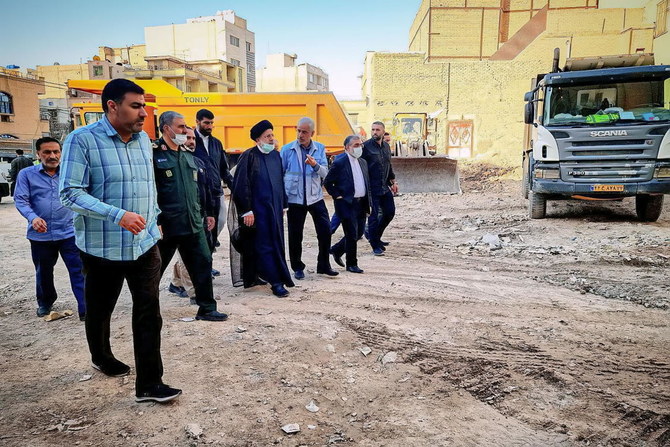The death toll in the collapse of a building in southwestern Iran rose Monday to at least 41, state media reported, two weeks after the disaster struck.
Ehsun Abbaspour, the governor of the city of Abadan, gave the figure based on an official report, state television said.
The May 23 collapse at the Metropol Building some 660 kilometers (410 miles) southwest of the capital, Tehran, has dredged up painful memories of past national disasters and shined a spotlight on shoddy construction practices, government corruption and negligence in Iran.
The structural building failure in the oil-rich but impoverished Khuzestan province has focused public attention on shoddy construction practices and prompted mass allegations of government corruption and negligence. Authorities have arrested 13 people as part of a broad probe into the disaster, including Abadan’s mayor, Hossein Hamidpour, who resigned last Friday.
Protesters have gathered in mourning at the collapse site, denouncing top officials and demanding accountability, according to videos widely shared on social media and analyzed by The Associated Press. However, reporting on events in Abadan remains extremely difficult as the threat of arrest looms. Authorities have disrupted Internet access, according to experts, restricting people’s ability to share videos and information.
In an effort to address public mistrust, President Ebrahim Raisi last Friday paid a surprise visit to Abadan, where he surveyed the disaster site and offered personal condolences to the families of victims. During his trip, businessmen lodged complaints about the scope of corruption in local government, state-run media reported.
Raisi vowed the government would “not hesitate to deal with the offenders” and would “monitor construction more closely, especially high-rise buildings.”
“The perpetrators should know that the passage of time will not absolve them of responsibility and accountability,” he said.
Supreme leader Ayatollah Ali Khamenei also touched on events in Abadan during his live televised speech on Saturday — providing further indication of their seriousness.
In his first speech outside his residence since the pandemic struck Iran, Khamenei warned of severe consequences for those who violated regulations and may have helped cause the disaster in Abadan.
“Those responsible must be brought to justice, their punishment should serve as a lesson for others, and similar incidents in future should be avoided,” he said.
Khamenei also blamed the recent outbreak of protests in the restive Khuzestan province on Iran’s “enemies,” including “treacherous Iranians” abroad, who he said try to harm the country’s interest through “psychological warfare and online campaigns.”
Reza Pahlavi, in exile in the US, the eldest son of Iran’s deposed monarch before the 1979 Islamic Revolution, last week seized on reports of growing anger in Abadan to call for the creation of a “unified front against the Islamic Republic.”


Death toll in southwestern Iran tower collapse rises to 41
Short Url
https://arab.news/pj3pr
Death toll in southwestern Iran tower collapse rises to 41

- It’s unclear how many more people remain unaccounted for in the collapse of the still under-construction tower at the Metropol Building in Abadan
- Rescuers were still working and families still waiting for word of their loved ones despite promises the search operation would be finished by now
Israel says carrying out ‘large-scale strikes’ on Tehran

JERUSALEM: The Israeli military said it launched “large-scale strikes” on Tehran on Monday, two days since the start of a US-Israeli campaign against Iran.
“The Israeli Air Force... has begun an additional wave of strikes against the Iranian terror regime at the heart of Tehran,” the military said in a statement.
“The Israeli Air Force... has begun an additional wave of strikes against the Iranian terror regime at the heart of Tehran,” the military said in a statement.
© 2026 SAUDI RESEARCH & PUBLISHING COMPANY, All Rights Reserved And subject to Terms of Use Agreement.












